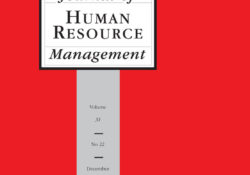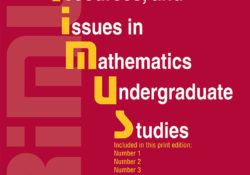eric.ed.gov har udgivet: The purpose of this two-year observational study was to determine if the use of technology and intervention groups affected fourth-grade math scores. Specifically, the desire was to identify the percentage of students who met or exceeded grade-level standards on the state standardized test. This study indicated possible reasons that enhanced conceptual understanding within the study group at a Title I elementary school. Throughout the two-year time period, the classroom teachers created mathematics awareness through technology, teamwork, engagement and rigor. The findings revealed a significant percent of fourth-grade students who used technology and participated in specific learning activities met or exceeded grade-level standards in math as measured by the Washington State standardized test. Link til kilde
Like this:
Like Loading...
eric.ed.gov har udgivet: Children who grow up in poverty are less likely to graduate high school, enter college and find economic stability. REAL School Gardens believes the right educational opportunities — ones that engage and motive children to learn — can break this cycle. The REAL School Gardens Program builds learning gardens and offers teacher training to improve academic engagement and performance in low-income elementary schools. Since its launch, REAL School Gardens has partnered with 92 low-income schools, and preliminary findings show that 84% of students experiencing hands-on academic lessons in a REAL School Garden report high levels of engagement, specifically in math in science. Another study demonstrated that REAL School Gardens’ partner schools exhibit, on average, standardized science test score pass rates 5.5% higher than non-partner schools. This article… Continue Reading →
Like this:
Like Loading...

tandfonline.com har udgivet en rapport under søgningen “Teacher Education Mathematics”: ABSTRACT ABSTRACT This paper argues that rather than being a process that can be objectively planned or predicted, regional engagement on the part of universities is a learning activity featuring characteristics of a subjective deliberation process. This subjective deliberation process is simultaneously influenced by factors operating at the intra-organizational and regional level, as well as the field in which the university is located. A model that takes this multilevel environment into account is applied to a single case study region: Kaiserslautern (Germany). A Q-methodological approach is employed to reveal and analyze the aforementioned subjective perspectives regarding drivers of universities’ regional engagement. Two key viewpoints emerge from this analysis: one perspective reflects a highly institutionalized reading of regional engagement, and can… Continue Reading →
Like this:
Like Loading...
eric.ed.gov har udgivet: This study was designed to explore the relationship between teacher practices and levels of student engagement in secondary agricultural education programs. Most researchers have agreed that student engagement at the secondary level may be measured through three constructs: cognitive engagement, behavioral engagement, and emotional engagement. The intra-curricular components, namely the FFA organization and Supervised Agricultural Experience Program, make secondary agricultural education unique when compared to the foundational classes of math, science, and English. Respondents included a total of 152 agricultural education programs, which were randomly selected within 11 states to participate in the study. One class in each program was surveyed, which totaled 2,106 student respondents. Relationships were identified between specific teaching and advising practices performed by the secondary agricultural educator and their students’ level of engagement… Continue Reading →
Like this:
Like Loading...
tandfonline.com har udgivet en rapport under søgningen “Teacher Education Mathematics”: Abstract Abstract In this study, we examine whether the relationship between employees’ perceptions of human resource management (HRM) and work engagement is mediated by job crafting. Using conservation of resources (COR) theory, we propose that HR practices offer job resources which employees reinvest by displaying job crafting behaviours. Since job crafting involves the pro-active redesign of job characteristics by employees, this study advances the idea that employees are pro-active in their response to HRM and translate perceived HRM practice into attitudinal outcomes through displaying pro-active behaviour. In support of this idea, our results show that the relationship between perceived HRM and work engagement is fully mediated by the job crafting type ‘increasing job resources and challenging job demands’. The job… Continue Reading →
Like this:
Like Loading...
tandfonline.com har udgivet en rapport under søgningen “Teacher Education Mathematics”: Link til kilde
Like this:
Like Loading...
tandfonline.com har udgivet en rapport under søgningen “Teacher Education Mathematics”: ABSTRACT ABSTRACT In this article, we approach large questions regarding justice and equality in the Nordic classrooms. A substantial body of previous research emphasises the importance of student engagement in teaching and learning. Drawing on video data from Norway, Sweden and Finland, we focus on whole-class teaching, i.e. situations in which the teacher addresses the class from the front of the classroom, to investigate justice trough participation. We have approached our topic through two concerns: student participation in classroom discourse and student engagement as providing access to content. Our findings seem to pose some serious challenges for the Nordic welfare society vision of classrooms as core societal hubs for justice and equality. While whole-class teaching is one of the primary… Continue Reading →
Like this:
Like Loading...
eric.ed.gov har udgivet: This study investigated factors from high school that might predict college persistence. The sample consisted of 7,271 participants in three waves of data collection (2002, 2004 and 2006) who participated in the Educational Longitudinal Study (ELS; U.S. Department of Education, 2008). A multinomial logistic regression mode was employed to distinguish those who persisted from those who did not. Results indicated that number of hours engaged in extracurricular activities and interaction with the math teacher outside of class distinguished those who persisted in a four-year college from those that did not. Implications for school, community, mental health and college student development counselors are discussed. Link til kilde
Like this:
Like Loading...
tandfonline.com har udgivet en rapport under søgningen “Teacher Education Mathematics”: Abstract Abstract The Mathematics Practicum has been offered at St. Olaf College for over 30 years. The Practicum is a 4-week, January Interim course where three teams of five students work on consulting problems solicited from area businesses, government agencies, and non-profit organizations. These problems have significant mathematical, statistical, and computational components. The projects end with a professional-quality student presentation at the client’s home office. This project-based, interdisciplinary, experience encourages problem solving, collaboration, inquiry, and communication skills. We discuss the logistics of the course, key factors that make this a positive experience for both the students and the sponsoring organizations, continuing challenges, and benefits to the students. Link til kilde
Like this:
Like Loading...
eric.ed.gov har udgivet: The “Building Blocks PreK Math Curriculum” (Clements & Sarama, 2007) was designed to facilitate children’s engagement in math and talk about math. Much research investigates the effect of curriculum on classrooms or teacher practices. This study used a mediational model to look at a curriculum’s effect on children’s achievement gain, operating through specific child behaviors in the classroom. Specifically, this study looked at how a math curriculum affected children’s focus in math alone or in all learning activities (math, literacy, science, social-studies, and other), talking during math-related activities or in all learning activities, and engagement during math or during all learning activities. Additionally, this study examined how those child behaviors predicted children’s math achievement gain. It is hypothesized in the existing literature that much of the variability… Continue Reading →
Like this:
Like Loading...




